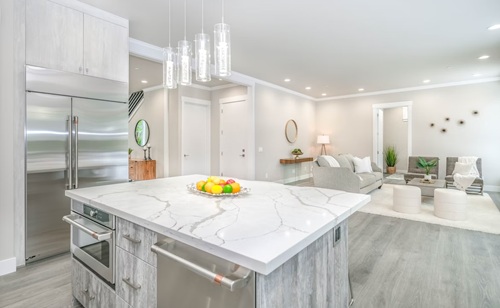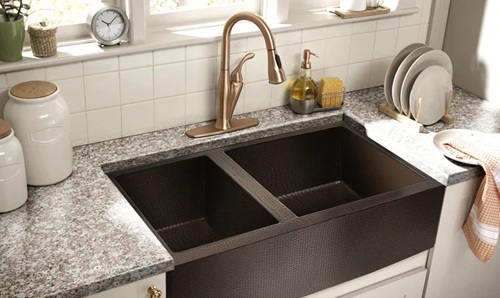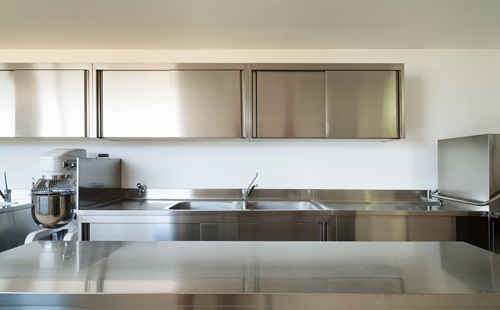Marble countertops have long been associated with luxury, elegance, and timeless beauty. For homeowners and interior designers alike, marble remains a popular choice when creating a high-end kitchen. But while marble offers unmatched visual appeal, it also requires thoughtful care and consideration.
This article explores the pros and cons of marble kitchen countertops in detail—helping you decide whether this classic material is right for your kitchen renovation or build.

🧾 What Is Marble?
Marble is a natural stone formed from limestone that has been subjected to heat and pressure over time. The resulting material is a metamorphic rock, known for its distinct veining, smooth texture, and luxurious shine. Popular marble types used in kitchens include:
- Carrara – soft gray with subtle veining (most affordable)
- Calacatta – white with bold, dramatic veins (premium)
- Statuario – bright white with mixed gray veins (luxury-grade)
Marble slabs are available in honed (matte) and polished (shiny) finishes, each offering a different look and level of maintenance.
✅ Pros of Marble Kitchen Countertops
1. Timeless Elegance and Beauty
Marble is renowned for its natural beauty. Its unique veining, color variation, and luminous surface create a luxurious, high-end aesthetic that few other materials can replicate. Each slab is one-of-a-kind, making your kitchen truly unique.
Design Tip: Pair white marble with matte black or brass fixtures for a stunning modern contrast.
2. Cool Surface Ideal for Baking
Marble remains naturally cool to the touch, making it ideal for rolling dough, tempering chocolate, and other baking tasks. It’s a favorite among pastry chefs and home bakers for this reason.
3. Increases Home Value
A kitchen with marble countertops often attracts potential buyers and can increase resale value. It’s a premium material that signals quality and luxury to real estate agents and homeowners alike.
Fact Check: According to Remodeling Magazine, upscale kitchen remodels featuring natural stone like marble yield a high return on investment (ROI).
4. Customizable and Versatile
Marble comes in a variety of colors, vein patterns, and finishes. Whether you prefer minimalist white, warm beige, or dark gray tones, there’s a marble slab to suit your kitchen’s theme—traditional, contemporary, or rustic.
5. Heat-Resistant
Marble is naturally heat-resistant, so it can withstand brief contact with hot pots or pans. However, it’s still advisable to use trivets to prevent thermal shock or surface discoloration.
❌ Cons of Marble Kitchen Countertops
1. Porous and Prone to Staining
Marble is a porous stone, meaning it absorbs liquids easily. Spills from wine, coffee, citrus, or oil can stain or etch the surface if not wiped up quickly. Even water rings can leave dull marks if left for long periods.
Pro Tip: Use a high-quality sealant and reapply every 6–12 months to reduce absorption.
2. Easily Scratched or Etched
Marble is softer than granite or quartz, making it susceptible to scratches and etching from knives, acidic foods (like lemon or vinegar), and cleaning agents. Even wiping with an abrasive sponge can dull its finish over time.
Fact: Polished marble shows etches and scratches more visibly than honed marble.
3. High Maintenance
Maintaining marble countertops requires regular sealing, gentle cleaning, and careful handling. You must avoid acidic or harsh cleaners, and spills must be cleaned immediately. It’s not a “set-it-and-forget-it” material.
4. Expensive
Marble is a premium-priced material, especially rare varieties like Calacatta or Statuario. The cost of the slab, installation, sealing, and future maintenance can be significant.
Price Range (India): ₹800 to ₹3,000+ per sq. ft.
Price Range (USA): $60 to $250+ per sq. ft., including installation
5. Not Ideal for Heavy Use Kitchens
If you have a busy household, frequently entertain guests, or cook often, marble may not be the most practical option. Over time, everyday wear and tear can lead to a worn, etched, or discolored surface, especially without diligent care.
⚖️ Comparison: Marble vs Other Countertop Materials
| Feature | Marble | Granite | Quartz | Butcher Block | Laminate |
| Aesthetic Appeal | Very High | High | High | Moderate | Moderate |
| Heat Resistance | High | High | Moderate | Low | Low |
| Scratch Resistance | Low | High | High | Low | Moderate |
| Stain Resistance | Low (unless sealed) | Moderate | High | Low | Moderate |
| Maintenance Needs | High | Moderate | Low | High | Low |
| Price Range | High | Moderate–High | Moderate | Moderate | Low |
| Best For | Luxury kitchens | High-traffic use | Busy families | Rustic kitchens | Budget makeovers |
🛠️ Maintenance Tips for Marble Countertops
- Seal Regularly: Use a high-quality stone sealer every 6–12 months to reduce porosity.
- Clean Gently: Wipe with a damp soft cloth and pH-neutral soap. Avoid vinegar, lemon, bleach, or ammonia.
- Use Cutting Boards: Never cut directly on the marble to prevent scratches and etching.
- Wipe Spills Quickly: Especially liquids like wine, oil, coffee, or citrus juice.
- Use Trivets and Mats: Protect the surface from hot pans, acidic foods, and heavy pots.
🏁 Are Marble Countertops Right for Your Kitchen?
✅ Choose Marble If:
- You want a luxurious, one-of-a-kind look that elevates your kitchen’s design.
- You do light cooking or baking and can commit to regular care.
- You’re prepared to maintain and seal the surface periodically.
- Aesthetics are a top priority, and you’re not deterred by imperfections over time.
❌ Avoid Marble If:
- You have young children, pets, or a busy kitchen prone to spills and stains.
- You prefer a low-maintenance, worry-free countertop.
- You’re on a tight renovation budget.
- You dislike visible signs of wear like etching or patina.
🧾 Final Verdict
Marble countertops are a classic and luxurious choice that bring unmatched beauty and elegance to a kitchen. They’re especially ideal for homeowners who prioritize design and are willing to invest time and care into maintaining the material’s integrity.
However, marble is not for everyone. Its porosity, susceptibility to etching, and higher cost make it less practical for kitchens that see heavy use or require low-maintenance solutions. Still, for those who love the look and are committed to upkeep, marble delivers a truly refined and timeless aesthetic.

